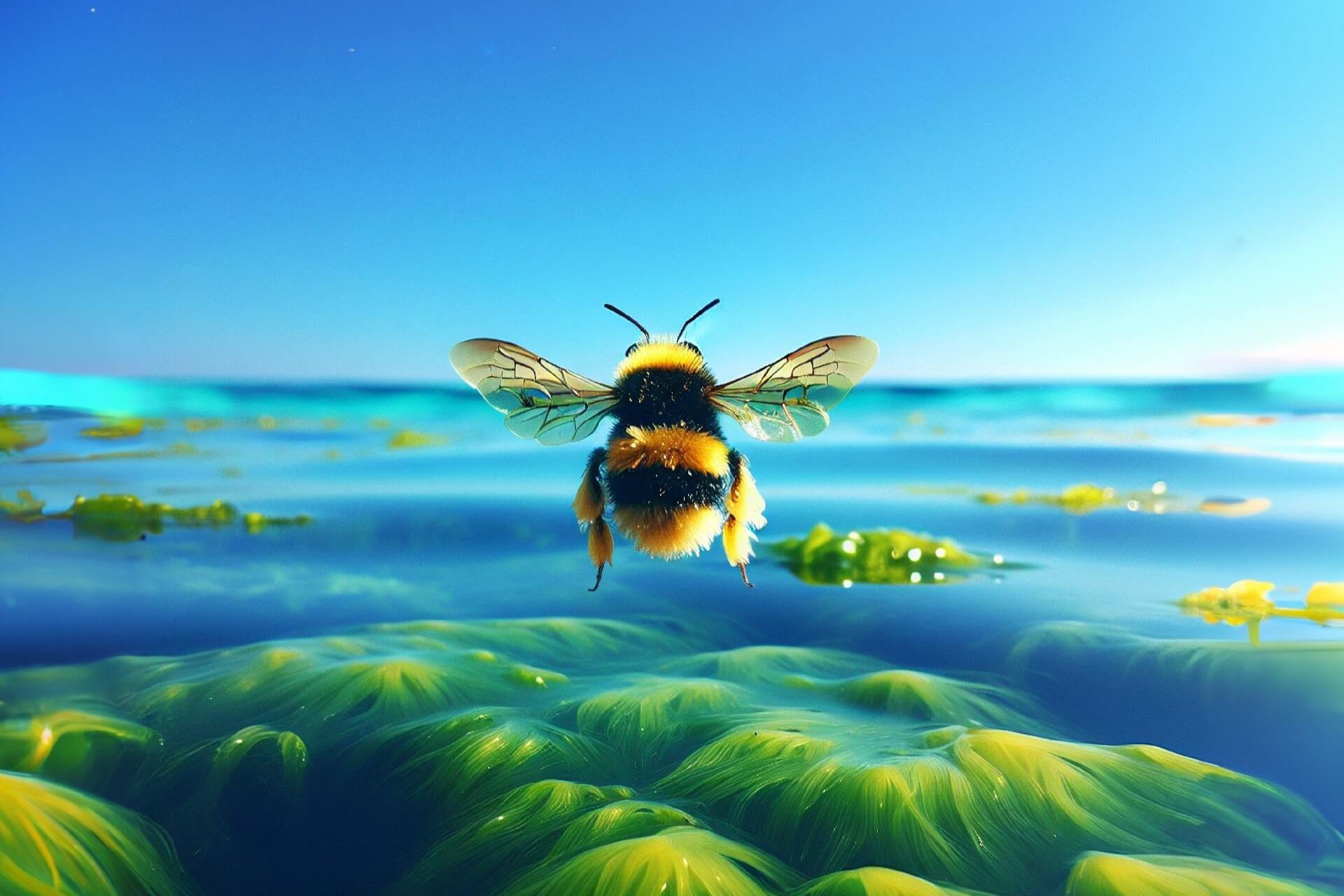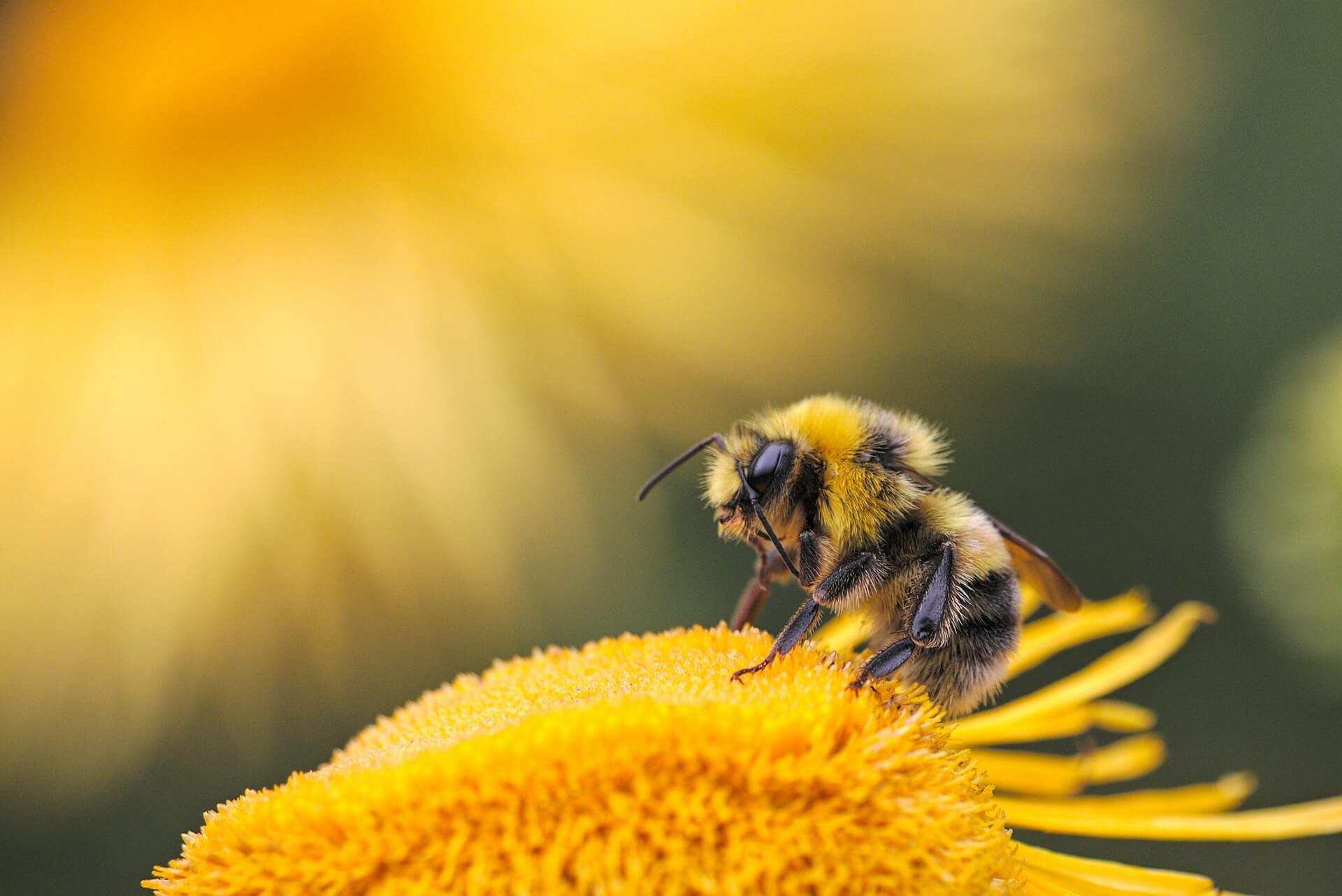2 Eco-friendly F&B Items for Earth Day
by David Klemt

This bee is having the time of its AI-generated life, frolicking over the sea.
It’s April 22, also known as Earth Day, and with that in mind I would like to introduce you to two products that focus on sustainability.
One is replacement for the standard cooking oils we know and love. The other is a practical stand-in for traditional honey.
The topics of sustainability, environmental friendliness, and responsible business practices are multifaceted. There’s combating food waste, upgrading to energy-efficient equipment and items that use less water… And there’s sourcing ingredients.
In the case of the two products below, both aim to be made with responsible production methods. The first seeks to use just a fraction of the resources needed to produce its traditional analogs. The other focuses on habitat restoration and protecting our planet’s all-important pollinators.
Algae Cooking Club
Seaweed isn’t just for scaring the hell out of people swimming in lakes or oceans. Instead, it’s now a viable substitute for vegetable, olive, canola, and other cooking oils.
Since it’s Earth Day (and Earth Month, of course), I want operators to be aware of this environmentally friendly alternative to traditional cooking oils.
According to the Algae Cooking Club website, “Many cooking oils are still sourced from industrial farming methods, while climate change is radically reducing crop yields. An estimated 1.4 billion acres of new farmland will be needed to feed a growing world. Algae offers an exciting alternative. Instead of waiting entire seasons to harvest, algae has the potential to produce high-quality fats, proteins, and nutrients in a matter of days with a fraction of the land, water, and carbon needed, without sacrificing flavor and quality.”
Per Elisabeth Sherman, writing for Food & Wine, Algae Cooking Club can credibly claim that production of their algae oil produces just half the carbon emissions in comparison to avocado, canola, and olive oil. Oh, it’s also packaged in a recyclable aluminum bottle.
There are several seaweed- or algae-based cooking oils available. I’m focusing on Algae Cooking Club’s oil because one of the world’s best restaurants is reportedly using it moving forward.
That restaurant is Eleven Madison Park, helmed by owner and chef, Chef Daniel Humm. Not only is the restaurant one of the best, it was named the World’s Best Restaurant by the World’s 50 Best Restaurants in 2017. Chef Humm claims that Algae Cooking Club’s oil doesn’t overpower delicate flavors, nor does it taste off or burnt.
So, if it’s good enough for one of the best restaurants and one of the best chefs in the world, it’s going to have my attention.
Mellody
I don’t want to start a debate here, but it’s important to note that there’s a dispute over whether honey is vegetarian or vegan.
On the vegetarian side of the discussion, it’s not meat or fish. Also, most people would say that bees aren’t harmed during the production of honey.
However, on the vegan side, honey is an animal product. Further, it’s a product produced by exploiting an animal. Therefore, honey can’t be vegan. And, yes, that means vegans will try to avoid consuming it.
Well, what if there existed a product that looked, tasted, cooked, and overall behaved like honey that didn’t exploit any bees? There is.
From Mellody Foods comes Mellody Plant-based Honey. Currently, there are two expressions: Golden Clover, and Spicy Habanero. Both, according to Mellody, are 1:1 matches to honey produced by bees.
The company claims that Golden Clover and Spicy Habanero tastes, drips, drizzles, and sticks like traditional honey. Each flavor is vegan, gluten- and glyphosate-free, and pollinator-friendly.
Crucially, both plant-based honeys are made using sugars, acids, and botanical extracts. Of course, Spicy Habanero includes its namesake pepper as well.
You and your culinary and bar teams can learn about Mellody here.
Takeaway
Eco-friendliness and sustainability are important values to a not-insignificant portion of the world.
It follows that a percentage of consumers seek out and want to support restaurants and bars that share their values. So, if the above products make sense for your concept, give them careful consideration.
If they’re not a fit, that’s fine. However, it’s a good idea to look into what products and practices you can embrace to become a more sustainable operator.
It’s possible you’re already greener than you think. Keep going.
Disclaimer: Neither the author nor KRG Hospitality received compensation, monetary or otherwise, in exchange for this post.
Image: Shutterstock. Disclaimer: This image was generated by an Artificial Intelligence (AI) system.


